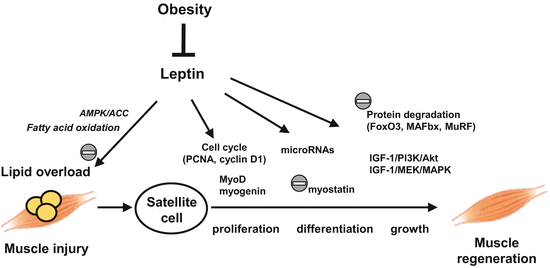Fig. 14.1
Schematic representation of the leptin’s effects on glucose and lipid metabolism in skeletal muscle
Recent studies have extended our understanding of the role of leptin in obesity and diabetes. The findings suggest there is a close association between leptin and the age-related changes in body composition that occur with sarcopenia or sarcopenic obesity, a condition that involves deteriorating insulin resistance and diabetes [43, 44]. Several studies have indicated that elevated leptin levels are associated with sarcopenia independent of obesity in adult humans [51, 52]. In a rodent model of obesity and diabetes, muscle regeneration was impaired following muscle injury because of the diminished proliferation and differentiation of satellite cells, tissue-resident stem cells in skeletal muscle [57, 59, 62]. Several studies in rodents have indicated that leptin signaling plays an important role in promoting skeletal muscle regeneration through the regulation of several proteins [66–68] and microRNAs [69] linked to muscle growth, cell cycle progression, and protein catabolism. Thus, the loss of functional leptin signaling might negatively impact skeletal muscle regeneration and contribute to sarcopenia in obesity and diabetes (Fig. 14.2).


Fig. 14.2
Mechanisms by which leptin signaling regulates skeletal muscle mass. Leptin reduces intramyocellular lipid that impairs the activity of satellite cells. Leptin also directly promotes skeletal muscle regeneration through the regulation of several proteins and microRNAs linked to satellite cell proliferation/differentiation, muscle growth, and protein catabolism. Impaired leptin signaling in obesity might negatively impact skeletal muscle regeneration and contribute to sarcopenia
Despite marked progress in recent years toward understanding the regulatory role of leptin in skeletal muscle lipid accumulation and glucose homeostasis, several questions pertaining to leptin’s potential therapeutic use in patients with obesity and/or diabetes remain to be answered. For example, does leptin resistance occur at the local level of skeletal muscle, and, if so, how does it develop in skeletal muscle during obesity? The fact that impairment of the regenerative capacity of muscle satellite cells has been observed only in extremely obese mice in which leptin activity was genetically ablated (ob/ob and db/db) is another important issue [66–68]. Further investigation is warranted to elucidate whether moderate impairment of leptin action, commonly observed in diet-induced obesity, affects the regenerative capacity of skeletal muscle in humans and to identify factors or signaling pathways that link muscle lipid accumulation and impaired satellite cell function in the context of leptin resistance. Given the information currently available, exercise [60] and caloric restriction [61, 72] might be promising ways to enhance skeletal muscle fatty acid oxidation and promote skeletal muscle mass maintenance via the regeneration of satellite cells in obese and diabetic patients with leptin resistance. Continued advances are expected to improve our understanding of leptin’s effects on glucose/lipid metabolism and skeletal muscle mass maintenance and to facilitate the therapeutic use of leptin in the treatment of human obesity and diabetes.
References
2.
Myers MG Jr (2004) Leptin receptor signaling and the regulation of mammalian physiology. Recent Prog Horm Res 59:287–304CrossRef
3.
Kielar D, Clark JS, Ciechanowicz A, Kurzawski G, Sulikowski T, Naruszewicz M (1998) Leptin receptor isoforms expressed in human adipose tissue. Metab Clin Exp 47(7):844–847CrossRef
4.
Guerra B, Santana A, Fuentes T, Delgado-Guerra S, Cabrera-Socorro A, Dorado C et al (2007) Leptin receptors in human skeletal muscle. J Appl Physiol 102(5):1786–1792CrossRef
5.
Kieffer TJ, Heller RS, Habener JF (1996) Leptin receptors expressed on pancreatic beta-cells. Biochem Biophys Res Commun 224(2):522–527CrossRef
6.
Bjorbaek C, Kahn BB (2004) Leptin signaling in the central nervous system and the periphery. Recent Prog Horm Res 59:305–331CrossRef
7.
Denroche HC, Huynh FK, Kieffer TJ (2012) The role of leptin in glucose homeostasis. J Diabetes Investig 3(2):115–129CrossRef
8.
Margetic S, Gazzola C, Pegg GG, Hill RA (2002) Leptin: a review of its peripheral actions and interactions. Int J Obes Relat Metab Disord 26(11):1407–1433CrossRef
9.
Morioka T, Asilmaz E, Hu J, Dishinger JF, Kurpad AJ, Elias CF et al (2007) Disruption of leptin receptor expression in the pancreas directly affects beta cell growth and function in mice. J Clin Invest 117(10):2860–2868CrossRef
10.
Pelleymounter MA, Cullen MJ, Baker MB, Hecht R, Winters D, Boone T et al (1995) Effects of the obese gene product on body weight regulation in ob/ob mice. Science 269(5223):540–543CrossRef
11.
Goodpaster BH, Wolf D (2004) Skeletal muscle lipid accumulation in obesity, insulin resistance, and type 2 diabetes. Pediatr Diabetes 5(4):219–226CrossRef
13.
Bates SH, Gardiner JV, Jones RB, Bloom SR, Bailey CJ (2002) Acute stimulation of glucose uptake by leptin in l6 muscle cells. Horm Metab Res 34(3):111–115CrossRef
14.
Berti L, Gammeltoft S (1999) Leptin stimulates glucose uptake in C2C12 muscle cells by activation of ERK2. Mol Cell Endocrinol 157(1–2):121–130CrossRef
15.
Berti L, Kellerer M, Capp E, Haring HU (1997) Leptin stimulates glucose transport and glycogen synthesis in C2C12 myotubes: evidence for a P13-kinase mediated effect. Diabetologia 40(5):606–609CrossRef
16.
Kellerer M, Koch M, Metzinger E, Mushack J, Capp E, Haring HU (1997) Leptin activates PI-3 kinase in C2C12 myotubes via janus kinase-2 (JAK-2) and insulin receptor substrate-2 (IRS-2) dependent pathways. Diabetologia 40(11):1358–1362CrossRef
17.
Ceddia RB, William WN Jr, Curi R (1999) Comparing effects of leptin and insulin on glucose metabolism in skeletal muscle: evidence for an effect of leptin on glucose uptake and decarboxylation. Int J Obes Relat Metab Disord 23(1):75–82CrossRef
< div class='tao-gold-member'>
Only gold members can continue reading. Log In or Register to continue
Stay updated, free articles. Join our Telegram channel

Full access? Get Clinical Tree







